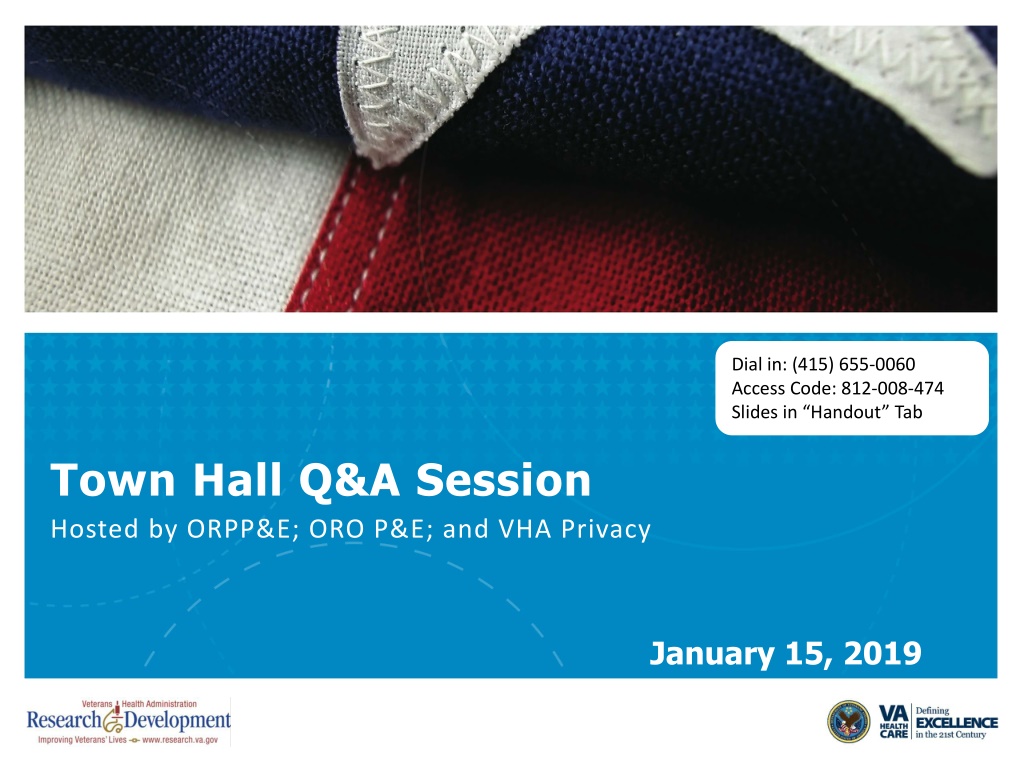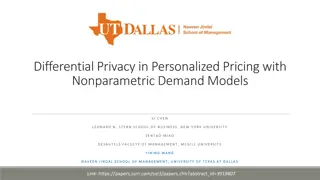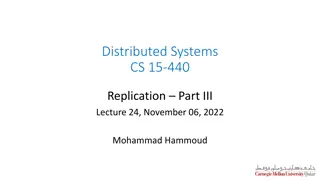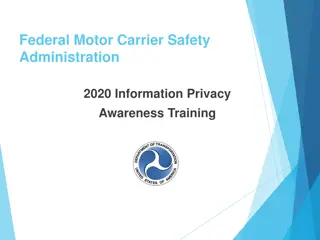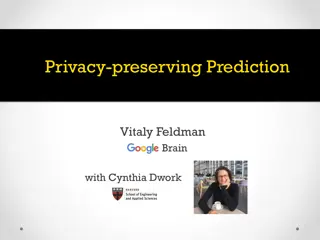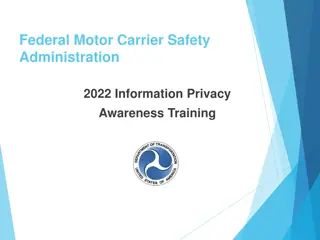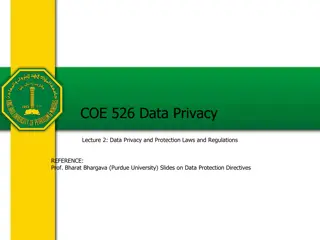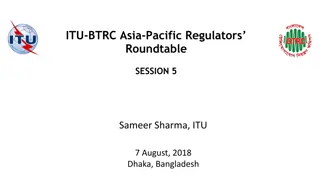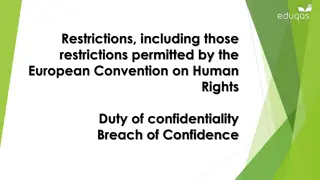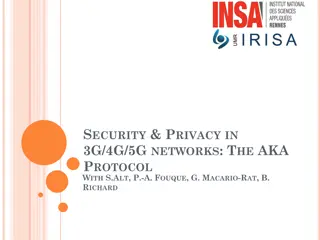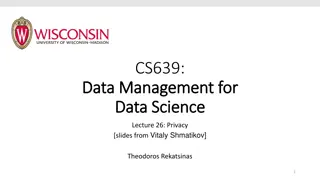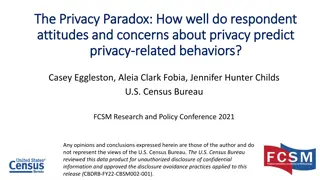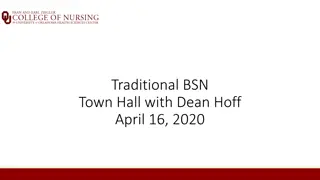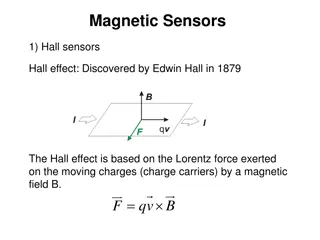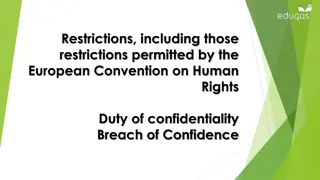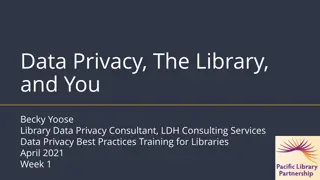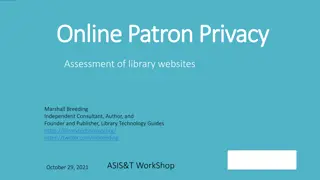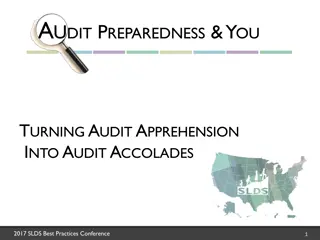Town Hall Q&A Session on Privacy and Research Protocols
A town hall Q&A session hosted by ORPP&E, ORO, and VHA Privacy on January 15, 2019, focusing on privacy, information security, and research protocols in healthcare. The session features key presenters discussing responsibilities of Privacy Officers and Information Security Officers in light of VHA Directive 1200.05 changes. The event addresses questions on protocol reviews, IRB approvals, and recommendations for conducting reviews effectively.
Download Presentation

Please find below an Image/Link to download the presentation.
The content on the website is provided AS IS for your information and personal use only. It may not be sold, licensed, or shared on other websites without obtaining consent from the author. Download presentation by click this link. If you encounter any issues during the download, it is possible that the publisher has removed the file from their server.
E N D
Presentation Transcript
Dial in: (415) 655-0060 Access Code: 812-008-474 Slides in Handout Tab Town Hall Q&A Session Hosted by ORPP&E; ORO P&E; and VHA Privacy January 15, 2019
Dial in: (415) 655-0060 Access Code: 812-008-474 Slides in Handout Tab Presenters Office of Research Protections, Policy, and Education Office of Research Oversight VHA Privacy Molly Klote, MD Director, ORPP&E (formerly PRIDE) Office of Research Development Veterans Health Administration 1100 1st Street NE Room 626 Washington DC 20002 Phone: (202) 443-5605 Mary.klote@va.gov Kristina Borror, PhD Director of Policy and Education ORO | VHA Office of Research Oversight Mailing Address: 810 Vermont Ave., NW (10R), Washington, DC 20420 Physical Address: 811 Vermont Ave., NW, Room 7-214, Washington, DC 20420 Phone: (202) 632-8304 Email : kristina.borror@va.gov http://www.va.gov/oro/ Stephania H. Griffin, JD, RHIA Director, Information Access and Privacy VHA Privacy Officer Office of Health Informatics (10A7) Veterans Health Administration Phone: (704) 245-2492 Email: Stephania.Griffin@va.gov C. Karen Jeans, PhD, CCRN, CIP Associate Director of Regulatory Affairs, ORPP&E VHA Office of Research and Development Department of Veterans Affairs 810 Vermont Avenue, NW (10P9) Washington, DC 20420 Phone: (202) 443-5712 Email: c.karen.jeans@va.gov Soundia A. Duche, MA, MS Chief, Education and Training/Program Analyst Department of Veterans Affairs Office of Research Protections, Policy, and Education (ORPP&E) Office of Research & Development 810 Vermont Ave., NW Washington, DC 20420 Phone: (202) 443-5658 E-mail: soundia.duche@va.gov 2
Dial in: (415) 655-0060 Access Code: 812-008-474 Slides in Handout Tab Overview of Session Questions Received in Advance Open Q&A session ORPP&E Mini-Moon Shoot Update 2019 Goals for ORPP&E Web-based Training 3
Dial in: (415) 655-0060 Access Code: 812-008-474 Slides in Handout Tab Privacy and Information Security 4
Privacy and Information Security Reviews Q1: VHA Directive 1200.05 has removed the paragraph on Privacy Officer and Information Security Officer Duties (paragraph 22 in the previous handbook). Does this mean that the PO and ISO no longer have to review research protocols prior to the IRB approving the study? 5
Privacy Officer/Information Security Officer Responsibilities Q2: VHA Directive 1200.05 (p.17) requires that the PO and ISSO be non-voting members or consultants to the IRB. It is otherwise silent on how the review should be conducted. Can you offer one or two recommendations regarding how this review should be conducted (e.g., should this review be conducted before or after IRB approval? Must the ISSO/PO review the research activity and provide recommendations, must the ISSO and PO approve the research activity, or both?) 6
Combining Informed Consent Form and HIPAA Authorization Q3: Directive/Handbook 1605.01 (page 49) states the following: An authorization for the use or disclosure of individually- identifiable health information for a research study may not be combined with the Research Informed Consent. This seems to contradict what is stated in VHA Directive 1200.05 paragraph 23a(1). 7
Combining Informed Consent Form and HIPAA Authorization (continued) Q4: If a study team combines the informed consent form and HIPAA Authorization into a single document, must the PO always review the HIPAA language in these combined documents? Is this true only when the IRB has determined that it needs PO consultation on a specific study? 8
Combined Informed Consent/HIPAA Authorization Template Q5: The following questions pertain to the VA IC-HIPAA authorization template distributed at Friday s Workshop on Informed Consent Tools: 1) Is there language re: participant access to their research related health records (as on pg 3 of 10-0493)? 2) The instructions indicate that wording indicating the auth will expire at the end of the study must be used, rather than including the other options included on pg 3 of 10-0493 (e.g. does not expire). 9
HIPAA Q6: Just to clarify, in the Common Rule, does the term de-identified mean removing the obvious identifiers (name, address, date of birth) or does it also include removal of all 18 of the HIPAA identifiers, such as date or location of service that might be used to reidentify the data by a statistician with access to a wide range public data sources? Q7: HIPAA Privacy Rule permits alterations of authorization by an IRB or Privacy Board. Why is this not allowable for VA-approved research? Q8: Why is a waiver of HIPAA authorization needed for eligibility determinations when performed by a VA workforce member. This requirement contradicts OCR guidance issued in June 2017. 10
Broad Consent and Posting ICFs Q9: Is there a definition of broad consent out there? Q10: We need to post ICFs for federally funded clinical trials (45 CFR 46.116(h)(1) within 60 days after the study has closed to recruitment; "one IRB-approved informed consent form used to enroll subjects". In multi-centered trials there may be various versions depending on local IRB requirements and all different contact information included in the form. Could we use the blank template or redact the contact information? I am also curious as to the purpose of this being included on clinicaltrials.gov. 12
Informed Consent Forms: Content Q11: For studies involving an FDA approved drug that is being studied for an unapproved or approved use or dose in a controlled, randomized, blinded clinical trial, how much information about the drug should be listed on the Informed Consent form? Should the ICD contain a list ALL known side effects? (Major, minor and rare side effects?) Should the ICD list a percentage or probability of known or anticipated permanent side effect? - If so, greater than what %? Would listing the characteristics of the drug on a separate brochure, be a viable option? What if there is no accompanying Investigational Brochure (IB)? What about listing the reactions of the investigational drug with other drugs? Who is responsible for discussing side effects and reactions, during the consent process? (PI, Pharmacy, Consenter?) 13
Informed Consent: Transitioning Studies with approved waivers Q12: If we transition a study that initially operated under a prescreening waiver but they are no longer recruiting, do we still need to reissue the waiver per the revised justifications? Does the fact that the study still has data that was collected under that initial waiver mean a new one needs to be issued under the 2018 requirements? 14
Informed Consent: Surrogate Consent Q13: VHA Directive 1200.05 does not address surrogate consent. Is there another Handbook/Directive that addresses this? Can we still use the procedure outlined in VHA Handbook 1200.05? 15
Informed Consent: Reconsenting Subjects Q14: Please clarify considerations for existing repositories (data and specimens) if/when participants may need to be re-consented as a result of the 2018 Common Rule. 16
Continuing Review: R&D Committee Q15: When is continuing review required by the R&D Committee or another committee other than the IRB? A few of the paragraphs in Directive 1200.05 seem to contradict each other. Specifically: Paragraph 8. IRB functions and operations states: Determining whether a study meets the criteria in Appendix B for exemption from the requirements of the Common Rule and when a study requires limited IRB review. NOTE: The investigator may not self-certify that a study is exempt. The R&D Committee must be responsible for initial approval and continuing review of the exempt research unless the research is assigned to another subcommittee (see VHA Handbook 1200.01); Paragraph 9. IRB review of research states: For research subject to the 2018 Requirements, if the IRB requires continuing review for any of the above circumstances, it must document its rationale for requiring continuing review in its communication to the investigator and institution. The R&D Committee is not required to conduct continuing review for studies approved by the IRB for which continuing review by the IRB is not required. Paragraph 10 Exempt review, states: Research determined to be exempt requires approval by the R&D Committee and requires continuing review by the R&D Committee as required by VHA Directive 1200.05 unless it is under the oversight of another subcommittee (e.g., Safety Review Subcommittee). 18
Continuing Review: Exempt Research and the R&D Committee Q16: Are there any plans to revise the VHA 1200.01 RDC handbook to no longer require Continuing review for all IRB reviewed studies to bring it in line with 1200.05? With the current version if 1200.01, the RDC will still require Continuing Review to be done for all Exempt, Expedited, Limited IRB Review and Studies in the data analysis/long term follow-up studies (in addition to all IRB reviewed studies) .effectively voiding 1200.05 s removal of continuing review for studies in these categories in terms of Investigator and Administrative burden. 19
Continuing Review: Tracking Financial Conflicts of Interests Q17: Is there any guidance for tracking Investigator Financial Conflict of Interests for studies that will no longer require Continuing Review? 20
Research Involving Individuals who Lack Decision-Making Capacity Q18: VHA Directive 1200.05 has removed the paragraph on conducting research with Individuals Lacking Decision-Making Capacity (Paragraph 20 in the previous handbook). Are there no longer any VA- specific requirements that have to be met when conducting research involving this vulnerable population? 22
Research Involving Children Q19: Per the VHA Directive 1200.05 (sec 21), the VA Director must approve participation in research that includes children. And de-identified data on children is still considered to be research. So by saying that, are you saying it s still considered to be human subjects research and therefore local IRB review/approval is required? We have a PI who wants to collaborate on a study taking place elsewhere. His role involves reviewing de-identified data (as confirmed by our PO). So in that case, would the IRB still need to review it? And then all other aspects of the ORD Guidance on Conducting Research Involving Children (10/20/14) be required? Or if it isn t considered human subjects research, does R&DC and the Director still need to evaluate in accordance with the 10/20/14 ORD guidance? https://www.research.va.gov/resources/policies/guidance/research- involving-children.pdf 23
Limited IRB Review: Guidance on Assessing Adequacy of Privacy and Confidentiality Measures Q20: When can we expect guidance from HHS on assessing what provisions are adequate to protect the privacy of subjects and to maintain the confidentiality of data? The regulations state that (i) The Secretary of HHS will, after consultation with the Office of Management and Budget s privacy office and other Federal departments and agencies that have adopted this policy, issue guidance to assist IRBs in assessing what provisions are adequate to protect the privacy of subjects and to maintain the confidentiality of data. 38 CFR 16.111(a)(7) 25
Research Involving Non-Veterans Q21: Who is responsible for determining whether non- veterans can participate in a research study? In VHA Handbook 1200.05, the IRB had to make this determination. I think it was said on one call that this will now be the responsibility of the R&DC. VHA Directive 1200.05 is silent on the process. 26
IRB of Record Q22: What is the process for requesting that ORD recognize another non-affiliated IRB to serve as an IRB of record for VA studies? 27
Certificates of Confidentiality Q23: Can you clarify the new CoC policy/procedure? As I understand, CoCs will now be automatically issued for any NIH-funded project using identifiable, sensitive information. Will CoCs also be automatically issued for studies funded by other entities and for non-funded studies, or will investigators still have to apply for them? 28
Agreements Q24: VHA Handbook 1200.05 had required that there be a written agreement that addresses such issues as the responsibilities of each party, the ownership of the data and the reuse of the data when a VA investigator undertakes collaborative research with a non-VA institution. VHA Directive 1200.05, by contrast, states that agreements regarding data use and transmission must be executed as required as applicable in VHA Handbook 1200.12. This Handbook, however, does not pertain to specimens. Therefore, in some cases (e.g., specimens), collaborative research can now be undertaken without a written agreement? 29
VA Investigators: Contractors Q25: Specifically regarding contractors, we are trying to understand the definition of an investigator particularly with regards to contractors. We understand that a contracted clinician cannot conduct VA research and that it is not appropriate to make that person a WOC while they are also working their contract hours to allow them to have the necessary VA appointment they require. What about a scenario where a contracted VA clinician works 20 contract hours. Could that person also receive a WOC (say through the NPC) to conduct VA research, as long as it is not on the contract hours? Does the term investigator apply to anyone on the study team (data analysts, etc.) or is that directly only to PI s and sub-investigators? If a contractor is included on a VA grant budget proposal, is it assumed that person will work on the project. Are they just not to be listed under the facility VA s IRB approval (and thus also under their FWA)? Or can these lower level study staff be included (because they don t fall under the investigator status)? 30
Mini-Moon Shoot Update The Moonshoot initiative is an overarching plan to get us to Jan 20, 2020 Date of the Single IRB review mandate Cultural and policy changes Mini-moonshoot was the launch of documents to jumpstart common rule implementation Support standardization Support harmonization Support reliance on each others IRBs for single review 33
Goals for Web-based Training in 2019 ORPP&E to administer all web-based training sessions Revise webpage to include a calendar of upcoming training. Goal is to post upcoming training on the calendar approximately 2 months out Training announcements will continue to be circulated to the various listservs At a minimum, continue to have monthly cyberseminars on the 3rd Tuesday of each month and monthly workshops on the 1st Friday of each month Broaden training to incorporate more than just core topics 36
Areas of Focus for 2019 Web-based Training 2-3 Town Hall Q&A sessions during the year 2-3 beginner sessions that are focused specifically on those new to research (e.g. meeting minutes; reviewer responsibilities, reviewing non-compliance; Intro to FDA Regulations) 3-4 advanced sessions covering topics such as VINCI and Right to Try Host multi-part series on topics such as Expanded Access and Collaborative Research Continue covering core topics (e.g. ISO/PO Review; Safety Committee Review; R&D Committee Review; Exempt Research) Host 1-2 sessions specifically geared at study teams 37
Important Links Final Rule for the Delay (published June 19, 2018) Revised Common Rule (published January 19, 2017) Pages 7259 to 7274 contain the Text of the Final Rule Current Common Rule VHA Handbook 1200.05 ORD Policies and Guidance Documents ORPP&E Cyberseminars 38
